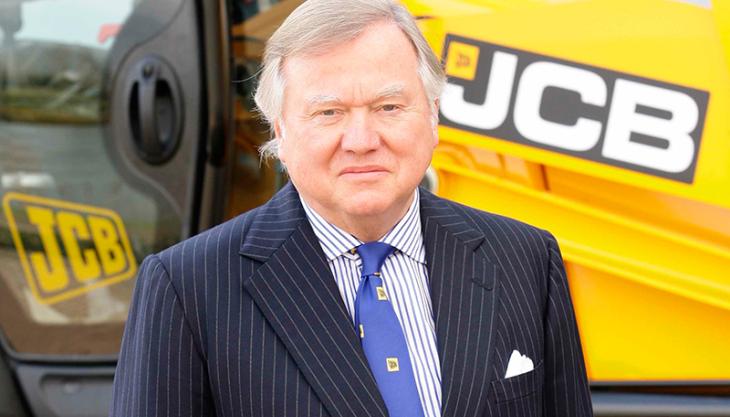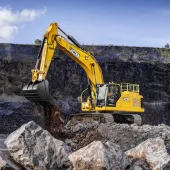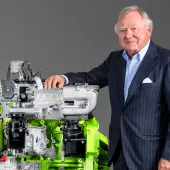Lord Bamford delivers maiden speech in House of Lords

JCB chairman uses maiden speech to champion the cause of engineering and British manufacturing
JCB chairman Lord Bamford delivered his maiden speech in the House of Lords on Tuesday 10 June, during which he championed the cause of engineering and British manufacturing.
Sir Anthony Bamford was made a life peer in August 2013 and officially took his seat in the House of Lords on 7 November.
An extract from Lord Bamford’s 10-minute maiden speech is reproduced below:
Membership of this House is an extraordinary opportunity and a great privilege. My sense of gratitude is equalled only by my sense of responsibility. It reminds me of how I felt when, nearly 40 years ago, I had the good fortune to take over the reins of the company, JCB, to which I owe my presence here today, and so much else. That was in 1975. I was 30 years old and, as it happens, so, too, was JCB. It was founded on the day that I was born, in 1945, just after the war, by an engineer and inventor of genius – my father– in a 12ft by 15ft garage, in Uttoxeter, Staffordshire. The Bamfords were blacksmiths in Uttoxeter in the 1820s; two centuries on, we are still there, only we do not shoe horses any more. We make diggers – lots of diggers.
Britain has changed since 1975. It has changed for the better in countless ways. It is a freer, happier and more prosperous country. However, some changes sadden me, and would indeed sadden and disturb any lifelong manufacturer. In 1975, manufacturing represented over 27% of our GDP; today, it represents just 11%. In 1975, manufacturing employed over 7 million people, more than 30% of the total workforce; today, it employs 2.5 million, less than 8%. In 1975, manufacturing contributed to a healthy balance of payments; sadly, this has been in deficit since 1984. These are concerning numbers for those of us who want a strong, vibrant, stable and balanced economy.
But I believe that there is much to celebrate about UK manufacturing. Britain has many world-class manufacturers, making innovative, high-quality and high value-added products. We have companies, in other words, that make products that the world wants to buy – small, specialist and world-class businesses, as well as much larger industry leaders, such as Rolls-Royce, GKN, BAE, Jaguar Land Rover and, yes, JCB, which exports 80% of its UK-manufactured products.
So manufacturing still matters to the British economy. In fact, it matters a great deal. Financial services account for just 12% of UK exports; the figure for manufacturing is 46%. So manufacturing is neither dead nor dying. On the contrary, it is showing every sign of life, with clear potential in value-added industries. I applaud the fact that manufacturing and engineering are back in favour with Ministers. I would simply emphasize that the support needs to be far-reaching and substantial. The Government are right to set their sights high; they are right to seek to double exports to £1 trillion by 2020. We must reverse the trade deficit that we have been carrying for over 30 years, but we will not get there without manufacturing or without a coherent, long-term industrial strategy.
The year 1945 was not just the year of my birth and that of JCB. It was also the year of Germany’s rebirth. Today, Germany is the world’s largest net exporter – not China, as you might expect. Is it any wonder that Germany has enjoyed a healthy balance of payments for many years? How did they do it? They did it in part by having a coherent, long-term industrial strategy and by focusing on high value-added products. They did it by spending more on R&D than we do – 70% more. And they did it by backing their exporters. Over the past 10 years, Germany’s export credit agency backed 10 times as much export business as ours did. Germany did it by supporting family businesses under its Mittelstand model. We should do likewise in Britain, where family businesses provide more than 9 million jobs – far more than public companies.
Finally, and crucially, Germany did it by showing a real commitment to technical education. Technical education is a subject especially dear to my heart. I believe that we have a duty to identify and nurture young talent. That is why, in 2010, we opened the JCB Academy in Staffordshire. The academy is now giving five hundred 14- to 19-year-olds a hands-on technical education: 40% of their curriculum is devoted to engineering. They spend half the day in overalls working with state-of-the-art equipment, not just for the benefit of JCB but for British industry as a whole. Many of our leavers are now choosing higher apprenticeships as a sensible and practical alternative to university. We are creating real opportunities in industry for our young people. In recent years there has been much progress in the field of technical education. We need, however, to do more – much, much more.







